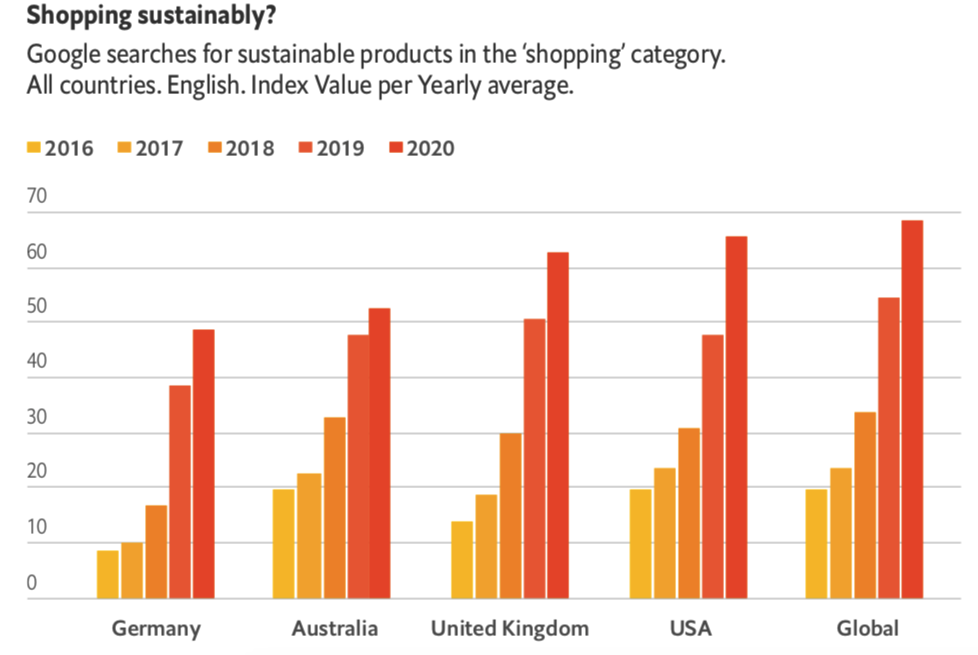Top reasons buyers seek sustainability information
April 22, 2022Buyers want sustainability information-make it for them to find it.
There’s no question that the pandemic increased global awareness of environmental issues and sparked a renewed commitment to finding more sustainable solutions. As a result, consumers increasingly factor sustainability into their purchasing decisions. They’re paying attention to brands’ environmental practices, and the trend is only expected to continue.
One example is the fashion industry. Due to increased awareness around using ethical fashion for sustainability, the global ethical fashion market is projected to grow from $6.3 million in 2020 to $10.1 million in 2025. And it’s not just retail – there are other sectors like financial services, food, cosmetics, and the manufacturing industry that also embrace socially responsible practices.
Ultimately, the big takeaway is that sustainability initiatives have gone from being a “nice to have” to becoming essential. And as a result, they have become a way to differentiate from the competition. That means consumers expect transparency when seeking this information during the purchase journey. Let’s review some key reasons your customers demand sustainability information and how you can deliver it.
Consumers look at the brand’s environmental footprint
According to The Economist, consumers believe that companies have as much responsibility as governments to create positive environmental change. As a result, customers now align themselves with brands compatible with their values and priorities. Because environmental stability is a high priority for many people, brands must do their part to lower their carbon footprint.

As reported by the Mintel Sustainability Barometer, when asked what encourages them to buy sustainable products, consumers want to know how their purchase has a direct impact — like a tree being planted. They’re also looking for product labels showing the effect on the environment, such as carbon dioxide emissions. And just over two in five respondents want information measuring impact using quantities they can understand, like liters of water used or distance traveled in miles.
Calling into question chemical and plastic impacts
Plastics are all around us. Eventually, it invades our ecosystems, where they can harm both people and animals. With plastics being manufactured by some of the chemical industry’s largest companies, more consumers are concerned about the adverse effects on the environment.
In a report by Accenture, 77% of respondents said plastic is the least environmentally responsible type of packaging. Not only that, but approximately one in four people surveyed believe that of the nine industries included, the chemical industry is the least worried about its environmental impact. Participants also ranked the chemical industry lowest in communicating how its products affect the environment, with 72% stating they were “not very confident or not confident at all.”
Consumers acting on environmental sustainability
Globally, sustainability is rated as a critical purchase criterion for 60% of consumers
According to The Economist Intelligence Unit, there has been a 71% increase in online searches for sustainable goods globally over the last five years. And the trend isn’t just in first-world countries. Consumer satisfaction in developing and emerging regions is also tied to concerns around sustainability. But customers aren’t just searching for information – they’re taking action.
Most importantly, consumers are making purchase decisions based on sustainability and eco-friendly practices.
Globally, sustainability is rated as a critical purchase criterion for 60% of consumers, as reported by the 2021 Global Sustainability Study. In addition, the latest EY Future Consumer Index suggests that 43% of consumers globally want to buy more from companies that benefit society, even if their products cost more. Consumers often say they’ll pay more for sustainable products but don’t support that intention with action. In a post-pandemic world, there are clear signs that this intention gap will close.
The demand for brands committing to sustainability
According to the most recent Global Sustainability Study, 85% of consumers have shifted their purchase behavior towards being more sustainable over the past five years. Consumers see themselves as change agents and seek brands that commit to sustainability.
In fact, a recent Forrester study reveals that 68% of highly empowered consumers plan to increase their efforts to identify brands that reduce environmental impact. And 61% will seek out energy-efficient labels when making purchases.
Think about how impactful product information becomes in the buying journey when it conveys that critical information to your buyer?
Events over the last several years have accelerated sustainability initiatives for brands across the globe. That means you have an opportunity to improve the environment and bolster your company’s reputation and enhance customer loyalty. One of the critical things to aid in that effort is a product information management (PIM) system which allows you to be more transparent.
A PIM system enables you to provide accurate and important product data so customers can make more informed decisions. This includes high value. sustainability and eco-friendly product information. If buyers want more sustainable products, and they’re willing to seek them out, help them find the information they need to make those decisions.
To do that requires transforming the ways in which you onboard, create, and distribute your product data. Product information needs to scale across channels, meeting omnichannel requirements, and buyer needs.
Growth, Sustainability, and Scalability – The Prysmian Group